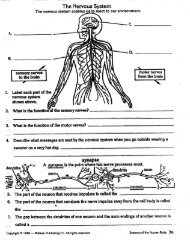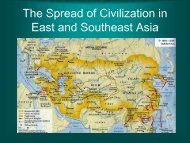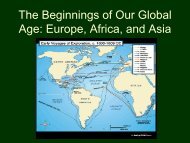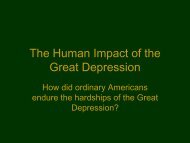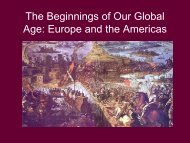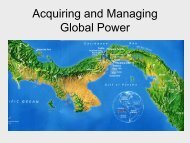Chapter Four: Early People of the Aegean
Chapter Four: Early People of the Aegean
Chapter Four: Early People of the Aegean
Create successful ePaper yourself
Turn your PDF publications into a flip-book with our unique Google optimized e-Paper software.
<strong>Early</strong> <strong>People</strong> <strong>of</strong> <strong>the</strong> <strong>Aegean</strong>
Minoans<br />
• Island <strong>of</strong> Crete<br />
• Height <strong>of</strong> Civilization<br />
is 1600-1500 BC<br />
• Based on trade not<br />
conquest<br />
• Trade with Egypt and<br />
Mesopotamia<br />
• 1400 BC <strong>the</strong>y<br />
disappear
Palace at Knossos
Mycenaeans<br />
• 1400-1200 BC<br />
• First Greek speaking<br />
people we have<br />
record <strong>of</strong><br />
• Sea traders; Sicily,<br />
Egypt, Mesopotamia<br />
• City-states on<br />
mainland; warrior-king<br />
• Trojan War 1250 BC
• Attack from <strong>the</strong> north<br />
• Mycenaean’s already<br />
in decline<br />
• 750 BC-Homer<br />
• Illiad-gods,<br />
goddesses, talking<br />
horse, Trojan War,<br />
and Achilles<br />
• Odessey-Odysseus<br />
going home to<br />
Penelope<br />
Dorian Greeks
Geography <strong>of</strong> Greece<br />
• Balkan Peninsula<br />
• Mediterranean Sea<br />
• Mountains divide land<br />
into isolated valleys<br />
• Rugged coastline<br />
• Rocky islands
City-States<br />
• Not a large empire;<br />
small, isolated citystates<br />
• Trade and make war<br />
on each o<strong>the</strong>r<br />
• Seas link <strong>the</strong>m to<br />
outside world<br />
• Trade olive oil, wine<br />
for grain, metals, and<br />
ideas<br />
Phoenician Alphabet
• Major city or town and<br />
surrounding<br />
countryside<br />
• Small population<br />
• Citizens had<br />
rights/responsibilities<br />
• Rights unequal; male<br />
land holders have<br />
power<br />
• Monarchy,<br />
aristocracy, oligarchy<br />
Polis
Greek Unity<br />
• Sparta-warrior<br />
• A<strong>the</strong>ns-democracy<br />
• What holds <strong>the</strong>m<br />
toge<strong>the</strong>r<br />
• Religion-poly<strong>the</strong>istic<br />
• Mt. Olympus<br />
• Zeus, <strong>the</strong> King <strong>of</strong> <strong>the</strong><br />
gods
Around <strong>the</strong> Mediterranean<br />
• Trade brings contact<br />
with people like <strong>the</strong><br />
Phoenicians and<br />
Egyptians<br />
• Greeks see <strong>the</strong>se<br />
people as barbarians<br />
• Feel superior and<br />
unique
Persian Wars<br />
• 499 BC-Ionian<br />
Greeks rebel against<br />
Persian rule<br />
• A<strong>the</strong>ns sends ships to<br />
help<br />
• Persians crush<br />
rebellion<br />
• Darius wants to<br />
punish A<strong>the</strong>ns
Victory-Round One<br />
• They land near<br />
Marathon in 490 BC<br />
• A<strong>the</strong>ns asks for help<br />
• Outnumbered, <strong>the</strong>y<br />
beat <strong>the</strong> Persians
• Darius dies<br />
• 480 BC-his son<br />
Xerxes sends a large<br />
force<br />
• Sparta agrees to help<br />
A<strong>the</strong>ns<br />
• Thermopylae<br />
• Persians march<br />
south; burn A<strong>the</strong>ns<br />
• Warships sink Xerxes’<br />
fleet<br />
This Is Sparta
The Delian League<br />
• A<strong>the</strong>ns most powerful<br />
city-state<br />
• Start league as a<br />
defensive alliance<br />
• A<strong>the</strong>ns dominates it<br />
• Uses league money<br />
to rebuild <strong>the</strong> city<br />
• Uses force to keep<br />
o<strong>the</strong>r members from<br />
leaving
Golden Age<br />
• 460-429 BC A<strong>the</strong>ns<br />
• Pericles<br />
• Direct democracy<br />
• All citizens participate<br />
• Trial by jury
Peloponnesian War<br />
• Sparta and A<strong>the</strong>ns’<br />
o<strong>the</strong>r enemies form a<br />
counter to <strong>the</strong> Delian<br />
League<br />
• 431 BC A<strong>the</strong>ns and<br />
Sparta go to war<br />
• Lasts 27 years<br />
• Sparta wins; ends<br />
A<strong>the</strong>ns’ domination <strong>of</strong><br />
<strong>the</strong> Greek world
The Age <strong>of</strong> Philosophers<br />
• Math; music; logic<br />
• Reason and<br />
observation<br />
• Ethics and morality<br />
• Sophists-success is<br />
more important than<br />
rhetoric<br />
• There is no one truth<br />
Nothing Exists.<br />
If anything existed, it could not be<br />
known.<br />
If anything did exist, and could be<br />
known, it could not be<br />
communicated.<br />
Gorgias <strong>of</strong> Leontini (483-378 BC)
• Critic <strong>of</strong> <strong>the</strong> Sophists<br />
• Socratic method:<br />
Question everything<br />
• Know thyself; only <strong>the</strong><br />
pursuit <strong>of</strong> good brings<br />
happiness<br />
• Seen as a threat to<br />
values and tradition<br />
• At 70 he’s put on trial<br />
for corrupting youth<br />
Socrates
• Student <strong>of</strong> Socrates<br />
• Rational thought and<br />
ethical values<br />
• Distrusts democracy;<br />
rejects A<strong>the</strong>ns’<br />
version <strong>of</strong> it<br />
• The Republic-ideal<br />
state<br />
• Workers; soldiers;<br />
philosopher-king<br />
Plato
Aristotle<br />
• Plato’s student<br />
• Logic; scientific<br />
method<br />
• The Golden Mean:<br />
Everything in<br />
moderation<br />
• The Lyceum
History<br />
• Herodotus-Fa<strong>the</strong>r <strong>of</strong><br />
History; traveled <strong>the</strong><br />
world interviewing<br />
people<br />
• Wrote ‘The Persian<br />
Wars’<br />
• Thucydides<br />
• Wrote ‘The<br />
Peloponnesian War’
The Hellenistic Age<br />
• 338 BC A<strong>the</strong>ns falls<br />
to Macedonian army;<br />
o<strong>the</strong>r city-states<br />
follow<br />
• Phillip II 359 BC<br />
unites <strong>the</strong> Greeks<br />
• Wants to conquer<br />
Persia<br />
• Assassinated; son<br />
Alexander takes over
Alexander <strong>the</strong> Great<br />
• Takes Persia; moves<br />
through Asia Minor,<br />
Palestine, Egypt<br />
• 331 BC-he takes<br />
Babylon<br />
• Crosses Hindu Kush<br />
• At 32 he gets a fever<br />
and dies<br />
• Empire divided
Alexander’s Empire
Alexander in Persia
Alexander’s Legacy<br />
• New cities-Alexandria<br />
• Greek Temples<br />
• Spreads Greek<br />
culture<br />
• New culture blends<br />
Greek, Persian,<br />
Egyptian, and Indian<br />
elements-Hellenistic<br />
The Lighthouse<br />
at Alexandria



